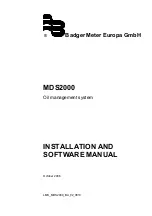
Samsung Programming
SVMi-8 Manual MMCs
MMC: 601
This type of UCD group has the following advantages:
a) No external device need be installed to provide an announcement.
b) Multiple callers can hear the announcement(s) s imultaneously.
c) Callers hearing the announcement will be transferred to a free
UCD group member (agent) as soon as the agent becomes avail-
able.
d) The callers place in the queue is always maintained.
Additional programming for this type of UCD group is in MMC 607 (UCD
Options).
B. RING MODE:
Each group can have one of the following ring modes. This will d e-
cide how calls are placed to the group.
1. SEQUENTIAL:
The stations listed as “members” (see below) will be called
on a ‘first available’ basis. Calls will first go to the first member; if the first
member is busy, calls will go to the second member; if the second member
is busy, calls will go to the third member, and so on. This type of group is
useful for placing the bulk of incoming calls with a selected individual, with
other members only getting the calls when the first member is busy.
2. DISTRIBUTED:
The first call will go to the first member, the second call will
go to the second member, the third call will go to the third member, and so
on. This type of group is useful for evenly distributing calls among all group
members.
















































